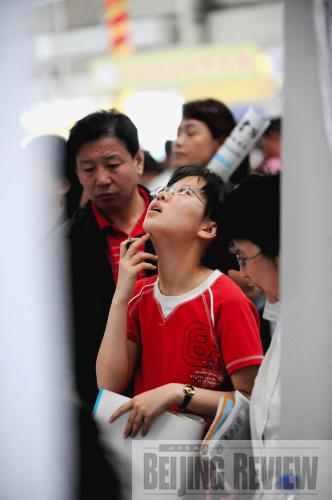|
 |
|
EQUALITY: Students are hopeful that discriminatory entrance requirements will be removed from university regulations (YANG XINYUE) |
Height Requirement Unfair
Since July 2, Chinese universities and colleges have begun enrolling new students. The candidates all hope to see a fairer and more transparent enrollment process. Their concern is not groundless, as discrimination against candidates based on physical conditions has already become a major factor affecting education equality.
China has several hundred colleges. They all have their own requirements for students' physical conditions and will, on this basis, reject students who fail to meet their standards.
For example, previous requirements of the Peking University Health Science Center stipulated: Candidates should not have positive hepatitis B surface antigen, and male candidates must not be shorter than 160 cm and females not shorter than 150 cm.
From a legal perspective, classifying students into different grades according to height and things of this nature not only breaches the Constitution but also makes education more unequal. Fortunately, under pressure from the legal community and the public as a whole, the Peking University Health Science Center repealed the abovementioned requirements from this year.
One of China's most prestigious higher learning institutions, the Peking University eventually changed its discriminatory policy as it always attracts much public attention. However, as for the many colleges that are not so prestigious and don't attract much attention, will they revise their own discriminatory policies on students' physical conditions too?
Legal Daily
Stop Corrupt Officials
The economic recession has forced many migrant workers to leave familiar jobs behind. If these workers want new city jobs, vocational training has become a must. The government is allocating more resources into various technical training programs. However, some officials are taking advantage of this well-intentioned policy to make extra money for themselves. These officials sell training opportunities to anyone who will pay and some directly run these programs. As a result, corrupt officials, instead of migrant workers in urgent need, become beneficiaries of the government's huge financial assistance.
Statistics show that, since 2008, more than 150 criminal cases involving training programs for migrant workers have been investigated, which exposed a lot of illegal actions taken by officials at various levels.
Most of these officials are in charge of such training programs and have the authority in fund allocation. Due to the slack supervision, they collaborate with illegal training institutions and line their pockets.
Jobs are the foundation for people's livelihood. In these tough times, vocational training subsidies are all that may stand between people and survival. As the government increases financial input in this field, how to strengthen supervision and properly use the subsidies is a priority.
Workers' Daily
Double Standard
Anyang in central China's Henan Province recently announced that all local scenic spots would be free to foreign passport holders in the second half of this year. Local tourism authorities explained that the "free admission" policy was expected to help attract more foreign visitors to the city, which is one of China's eight major ancient capitals. Among Anyang's many sites of historical and cultural significance, Yinxu, ruins of the last capital city of the Shang Dynasty dating back more than 3,000 years, is famous as the original source of oracle bones and oracle bone script, the earliest recorded form of Chinese writing.
According to Anyang officials, in many other countries, scenic spots do not charge admission fees; even if a small number of parks are not free, the price is very low. It is understandable to give foreigners free access to scenic spots in the name of following the international norm in this respect. But why doesn't this policy also cover domestic tourists?
Actually, Chinese visitors have more reasons to argue for free access to scenic spots. As we all know, China's per-capita income is still very low compared with a lot of countries worldwide.
If Anyang further expands the free access to domestic tourists, or reduces the admission fees, I believe local tourism will flourish. In that case, not only does Anyang respect the travel habits of foreign tourists, it also respects the reality of living in China.
Guangzhou Daily
Don't Blame Employers
In order to prevent driving under the influence of alcohol, police authorities in east China's Jiangsu Province recently issued an urgent notice, demanding local police officers severely punish those who drive after drinking. The notice specifically targets drivers who are government or business leaders, saying that the agencies or enterprises they work for will also be held accountable.
It is because of a series of serious traffic accidents that the Jiangsu police decided to take this tough stance.
It's all right to punish drunk drivers, but it seems to be going too far to involve all staff workers in the agencies or enterprises they work for in the punishment. There is no legal basis for the police to do so.
The punishment, which will be a black mark against drunk drivers and their employers, is tough enough, but it may not be as effective as expected. The best way to prevent driving under the influence of alcohol is to punish and educate the one who commits the offense. To blame someone's mistake on his or her employer and let others share the accountability will trigger additional conflicts rather than solve the problem.
Xinmin Evening News | 